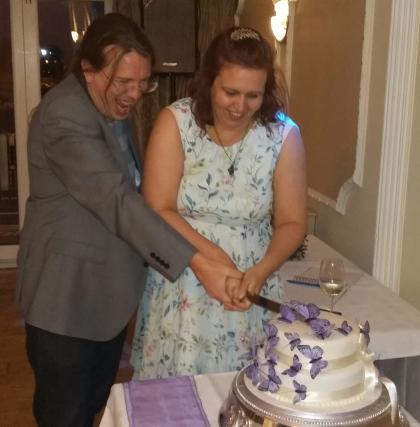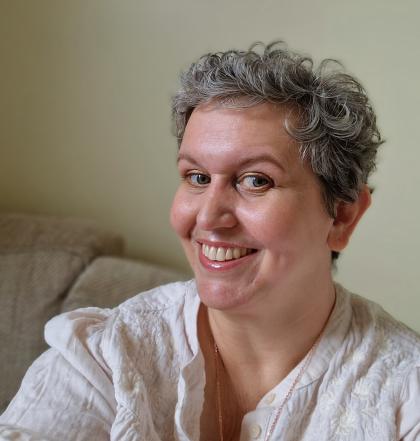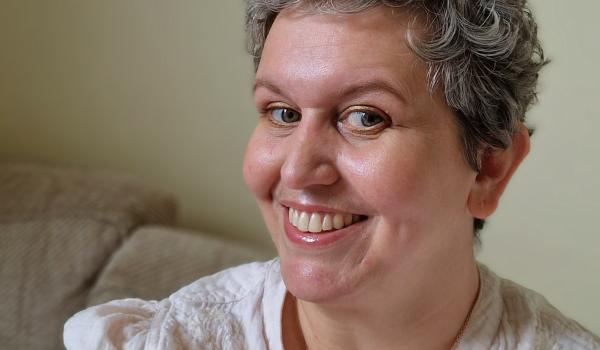Watch Megan's story on our YouTube channel
I've had problems with my periods and bloating for many years, so when I was away on a world trip, I didn’t think too much of the very tender tummy, painful cramps and bloating I was experiencing. That was until one day when I passed out on the bathroom floor.
I was in America at the time and fortunately was seen at the hospital where I had a thorough exam. They found a twisted cyst on my ovary and diagnosed me with polycystic ovary syndrome (PCOS). As I was away, they put me on the pill and gave me painkillers but said to see the GP when I was home.
The long wait for diagnosis
I wasn’t due to go home for another few months, and continued my travels passing through Finland, Japan and Vietnam. I was still in pain around my stomach and my back, and I was still bloated but the pill and painkillers did dampen the symptoms somewhat.
When I arrived in Australia, it was the start of the pandemic. I flew back home but as it was lockdown, I didn’t check out my diagnosis until October 2020. I had an ultrasound booked to confirm my diagnosis of PCOS, but there were delays so that didn’t take place until April 2021.
The ultrasound confirmed I had a cyst, but a big cyst measuring 10-12cm on my right ovary. The operation I was expecting was to remove the ovary and the fallopian tube, I opted not to have a full hysterectomy as I didn’t want to have a surgical menopause. They sent me off for an MRI scan to see exactly what they’d be dealing with.
Before this point, there was no mention of cancer. A few weeks later though, I opened my post to find a letter from the gynaecology department with a date and time to attend an appointment. I was shocked. They must’ve found cancer.
There was something suspect on the scan and they needed to investigate more. At that appointment they told me that I would need to have an operation, which they called a staging (also known as a laparotomy) where they would be able to see the signs of cancer and how far it had spread by taking biopsies from different organs around the ovaries.
Losing my husband
Going into the operation, I had no idea whether I had ovarian cancer. Coming out I still had no idea, but the recovery was painful, and the wait was worrying.
I'd recently lost my husband Matt to cancer, and I was convincing myself that the results would come back as stage III. They didn’t though. I had stage Ic – the cancer was at the top of my ovaries and hadn’t spread. It never entered my head that it could be stage I.

I needed chemotherapy for four and a half months after that. It was still during the pandemic, so it was different to when I used to go with my husband. I found this whole experience hard as it reminded me of that time.
I had very specific images and memories come to mind. I'd been in the same consultancy room as him, I was now in the same room having chemotherapy.
Matt had really long hair and wanted to keep this intact so had the cold cap. Sadly, he still lost his hair and seeing his distress at this, and knowing mine, I decided to have chemotherapy infusions.
The sessions lasted six and a half hours, which sounded long, but I was in a room with six other people, listening to podcasts and music, plus I was gifted some puzzle books from the students on the counselling course I was doing. It wasn’t cosy, but it wasn’t too bad.
The emotional impact
After you finish your chemotherapy, you can ring the bell. I did and walking out the hospital was a good feeling, but it has felt, at times, that when I walked out those doors, I've fallen off a cliff… the effects of cancer don’t stop after treatment. I felt alone and abandoned.
Suddenly, it felt, like my safety net was taken away and I had to figure things out on my own. Not only was I dealing with the cancer diagnosis, but I was also living alone after losing my husband and was adjusting to these two things in tandem.
No one knew what support I had or didn’t have.

A loss of my identity
It's been a few months since I finished chemotherapy and the psychological effect of cancer continues. I feel I've lost my self-image, my identity. My hair fell out and while it's growing back, it’s a completely different look and feel.
I’ve felt very tired, I haven’t been able to exercise so have put weight on, and I also don’t have a job due to being made redundant and then becoming ill.
When you’re going through your cancer treatment, you’ve got lots of appointments and things to focus on. When that stops, there’s a lot of time to think about other things which isn’t always helpful.
I think there's a huge gap in the market for support after cancer. I'm currently in the middle of a counselling course, and I'm really keen to do something that will help people in a similar situation in the future. I felt angry having to do this on my own, and no one should have to.
Finding support
I recently found the Ovarian Cancer Community run by Target Ovarian Cancer on Facebook.
This has given me moral support which has made a huge difference. I've never posted much, but there's comfort in knowing there’s a community that understands, more so than friends and family.
It's really hard to understand when you haven’t been through it. I have very good friendships and my family are great, but I know that they already worry about me.
I don’t want to add to their concern. On the Facebook Group I can be more brutally honest without worrying that I'm causing worry for others!
If you’ve been affected by this story and would like to speak to a specialist nurse, you can call our dedicated support line on 020 7923 5475 or contact us: [email protected]. We're open from 9am until 5.30pm, Monday to Friday.
If reading this story has helped you, join the Ovarian Cancer Community to connect with more people affected by ovarian cancer: www.targetovariancancer.org.uk/onlinecommunity



